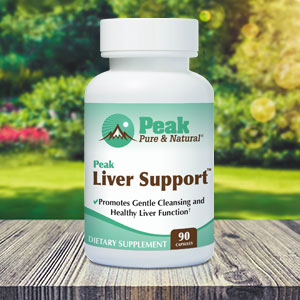Get Easy Health Digest™ in your inbox and don’t miss a thing when you subscribe today. Plus, get the free bonus report, Mother Nature’s Tips, Tricks and Remedies for Cholesterol, Blood Pressure & Blood Sugar as my way of saying welcome to the community!
The alternative fuel source that powers up your immune system

When you’re sick in bed with a cold or the flu, often the last thing you’re interested in is eating.
But then you worry — if I’m not getting good nutrition, will I get weaker and sabotage the healing process?
When I was a kid, the solution was chicken soup… but sometimes you can’t even keep THAT down.
What if your immune system actually works more efficiently when you don’t eat — or when you eat in a way that your body is offered up an alternative fuel source?
New research shows it may just give you the immune system boost you need…
What are ketone bodies?
At the center of the “fasting is better” hypothesis are ketone bodies — metabolic by-products the liver produces from stored fat that become more numerous when glucose, the body’s main source of energy, is in short supply.
The liver steps up to increase the production of ketones to feed our energy-hungry brain and other organs.
It can happen during exercise when your cells are burning through fuel rapidly.
It can also happen during fasting when there is little food available to be broken down into glucose.
It’s also what happens on the Keto diet, which aims to force the body into using ketones for fuel instead of relying on sugar.
How ketones impact immune health
A few years ago, scientists at Yale found that mice who ate a keto diet were able to fend off the flu virus better than mice who ate a diet higher in carbs.
And not long after that, research found a restrictive diet helped mice recover from a bacterial infection. Those scientists felt cutting off the glucose supply was beneficial and that ketones helped counter the oxidative stress caused by bacteria.
Now, scientists at The Van Andel Institute, a biomedical research center, have made another connection between the immune system and the ketone bodies that occur when we restrict our food intake.
Dr. Russell Jones and his team of researchers were surprised to find that, besides providing energy to the body when needed, ketone bodies also power immune cells.
In fact, they demonstrated that T-cells (immune cells) prefer ketone bodies over glucose as a fuel source.
They also found that ketone bodies improve T-cell function by “re-programming” them to better neutralize threats to the body.
And it seems that T-cells don’t fight infection as well when the production of ketone bodies is reduced — for example, when you eat a lot of carbohydrates.
And about eating or not when you get sick? The researchers hypothesize that ketone bodies may be an evolutionary failsafe that boosts the immune system when nutrient resources are limited, such as when one’s appetite is suppressed during illness.
Fueling your immune system with ketones
Going forward, Dr. Jones and his team will explore how fasting and ketone body supplementation can impact immune function. These findings may also pave the way for future personalized dietary recommendations to augment treatments for infection, cancer and other diseases.
But how can you put this revelation to work now?
Well, there are two ways, and some people even combine them…
The Keto diet and intermittent fasting actually have a lot in common. Keto works in many of the same ways that intermittent fasting works.
Some experts even advise that starting the Keto diet, which will have you giving up the carbs and sugars, may make it easier to then try intermittent fasting.
If you’re considering going keto and you’d like a more in-depth guide to the benefits and rules, check out The keto diet in a nutshell.
Intermittent fasting may be easier, in that there are many ways to do it…
- Alternate day fasting, which involves eating anything you want one day and nothing at all the next.
- You could also try a modified alternate-day fast schedule if cutting out all food for a day sounds too extreme. That involves eating 500 calories on fast days.
- There’s also a more moderate form of intermittent fasting where you limit your daily eating window to eight hours and fast for 16 hours, although this type of fast is less likely to produce ketones.
The keto diet and alternate-day fasting are safe for most people but check with your doctor before you start either, just to be cautious.
Editor’s note: Did you know that when you take your body from acid to alkaline you can boost your energy, lose weight, soothe digestion, avoid illness and achieve wellness? Click here to discover The Alkaline Secret to Ultimate Vitality and revive your life today!
Sources:
Alternative cellular ‘fuels’ boost immunity — Science Daily
Ketolysis drives CD8+ T cell effector function through effects on histone acetylation —Immunity















